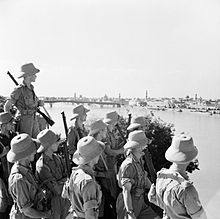| Anglo-Iraqi War | |||||||
|---|---|---|---|---|---|---|---|
| Part of the Mediterranean and Middle East theatre of World War II | |||||||
 British soldiers at Baghdad, 11 June 1941 | |||||||
| |||||||
| Belligerents | |||||||
|
Air and naval support: | |||||||
| Commanders and leaders | |||||||
|
|
| ||||||
| Strength | |||||||
|
1 infantry division[13] 2 brigade groups[nb 5] 100+ aircraft[nb 6] |
4 divisions[16] 30,000 troops[17] 116 Iraqi aircraft[18] (50–60 serviceable)[10] 21–29 German aircraft[4][19] 12 Italian aircraft[5] | ||||||
| Casualties and losses | |||||||
|
Casualties slight[20] At least 200 killed[21] 28 aircraft[22] |
500 killed[20] Most of the serviceable Iraqi aircraft[23] 19 German aircraft[5] 3 Italian aircraft[5] | ||||||
The Anglo-Iraqi War was a British-led Allied military campaign during the Second World War against the Kingdom of Iraq, then ruled by Rashid Ali al-Gaylani who had seized power in the 1941 Iraqi coup d'état with assistance from Germany and Italy. The campaign resulted in the downfall of Gaylani's government, the re-occupation of Iraq by the British, and the return to power of the Regent of Iraq, Prince 'Abd al-Ilah, a British ally.
Mandatory Iraq had been governed by the British since 1921. Prior to Iraq's nominal independence in 1932, Britain concluded the Anglo-Iraqi Treaty of 1930, which was opposed by Iraqi nationalists, including Rashid Ali al-Gaylani. Although Iraq was considered a neutral power under Regent Abd al-Ilah, it had a pro-British government. In April 1941, Iraqi nationalists organized the Golden Square coup, with assistance from Nazi Germany and Fascist Italy. The coup ousted Abd al-Ilah and installed al-Gaylani as Prime Minister. He officially established cordial relations with the Axis powers, prompting the Allies to respond. For the Allies, Iraq represented an important land bridge between British forces in Egypt and India.
Following a series of skirmishes, Allied airstrikes were launched against Iraq on 2 May. The campaign resulted in the collapse of al-Gaylani's short-lived government, and re-installed Abd al-Ilah as the Regent. This increased the influence of the Allies in the Middle Eastern theatre.
- ^ Wavell, p. 4094.
- ^ Waters, p. 24.
- ^ Cite error: The named reference
Carrwas invoked but never defined (see the help page). - ^ a b Cite error: The named reference
Playfair195was invoked but never defined (see the help page). - ^ a b c d Cite error: The named reference
Playfair196was invoked but never defined (see the help page). - ^ Sutherland, Jon; Canwell, Diane (2011). Vichy Air Force at War: The French Air Force that Fought the Allies in World War II. Barnsley: Pen & Sword Aviation. pp. 38–43. ISBN 978-1-84884-336-3.
- ^ Cite error: The named reference
Playfair182-3was invoked but never defined (see the help page). - ^ Playfair 1956, pp. 192, 332.
- ^ a b Playfair 1956, p. 186.
- ^ a b Cite error: The named reference
Playfair179was invoked but never defined (see the help page). - ^ a b Cite error: The named reference
Playfair183was invoked but never defined (see the help page). - ^ Patterson, David (2010). A Genealogy of Evil: Anti-Semitism from Nazism to Islamic Jihad. Cambridge University Press. p. 114. ISBN 978-0-521-13261-9.
- ^ Mackenzie, p. 101.
- ^ Cite error: The named reference
Playfair182was invoked but never defined (see the help page). - ^ a b c d Jackson, p. 159.
- ^ "https://resources.saylor.org/wwwresources/archived/site/wp-content/uploads/2011/08/HIST351-10.2.2-Anglo-Iraqi-War.pdf"
- ^ Lyman, Iraq 1941, p. 25.
- ^ Cite error: The named reference
Lyman2526was invoked but never defined (see the help page). - ^ Cite error: The named reference
Mack100was invoked but never defined (see the help page). - ^ a b Wavell, p. 3439.
- ^ "Resources.saylor.org" (PDF). Commonwealth War Graves Commission. Retrieved 12 August 2010.
- ^ Playfair 1956, p. 193.
- ^ Lyman, p. 48.
Cite error: There are <ref group=nb> tags on this page, but the references will not show without a {{reflist|group=nb}} template (see the help page).